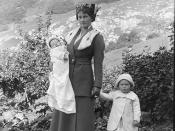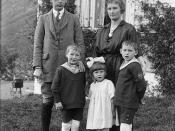"The Turner Diaries" is now a novel once written as a segment piece in a Neo-Nazi publication in the United States that ran from 1975 to 1978 called "Attack!". It was written by William L. Pierce under the pseudonym Andrew MacDonald. Pierce was not only a college professor in Oregon, but also the assistant to George Lincoln Rockwell in founding the American Nazi Party. The book is the narrated diary of a character, Earl Turner. This book, written by a blatant racist, has various racially degrading remarks. The two main ethnic groups targeted by this book are "blacks" and "Jews" although essentially the author is putting down all ethnic minorities and this can be seen in the epilogue when the author states that the only remaining group of persons in the world is "Aryans".
When analyzing a piece of political literature, one of the most important characteristics is it's effectiveness in initiating action or at least provoking thought.
One common way to initiate action is to call upon one's emotions. If a piece of literature evokes strong emotions about a particular stance, then the reader is more probable to take action. This can be seen in the Declaration of Independence for example when the authors make claims against the British Crown exposing and even exaggerating the way the colonists were being treated. The tone, rhetoric, and even the nature of the supportive examples used are often the main methods of evoking the desired kinds of emotions. In the Turner Diaries, Pierce appeals to emotion by taking a strong stand, in this case it is a racist stance that is also anti-government (at least the government at the time). The racism in this particular piece of political literature, although emotion stirring, nullifies many of Pierces' valid statements. If the...


